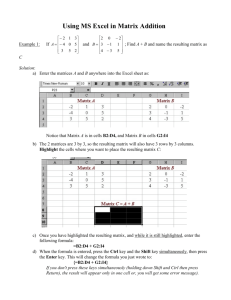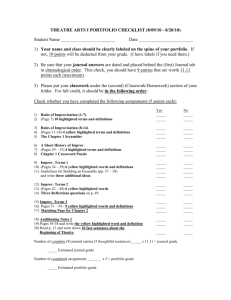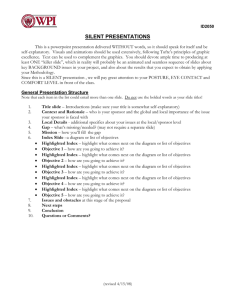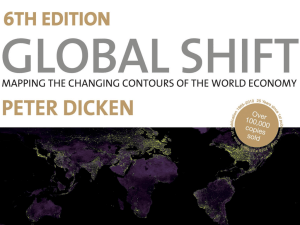14th African Oil, Gas and Minerals Trade and Finance
advertisement
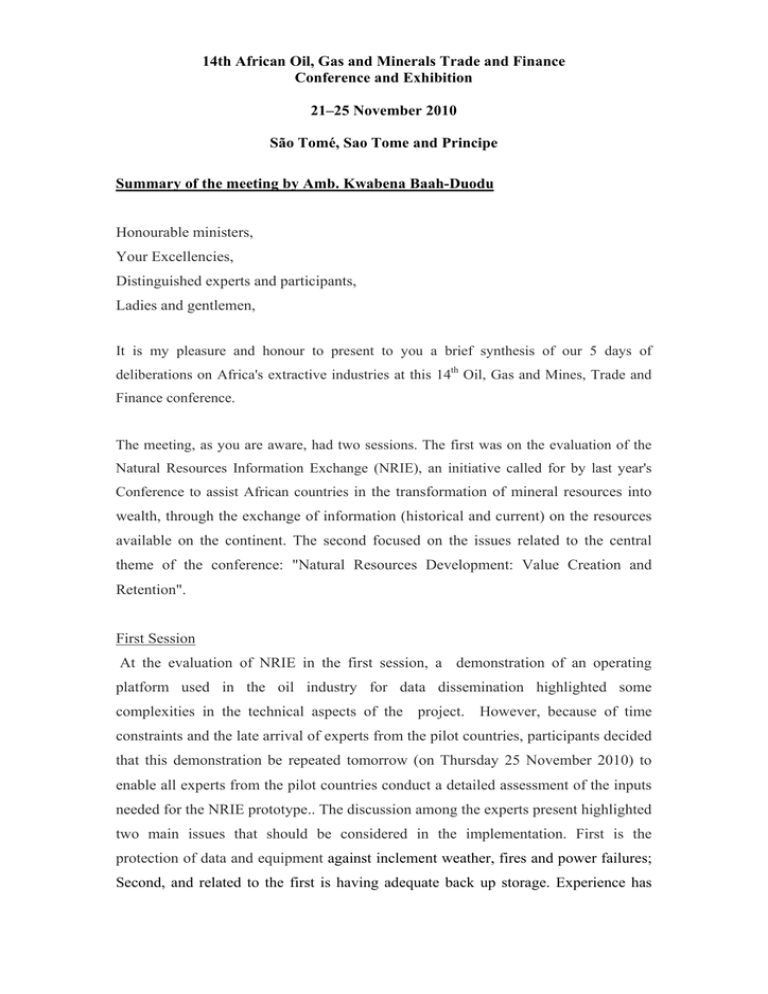
14th African Oil, Gas and Minerals Trade and Finance Conference and Exhibition 21–25 November 2010 São Tomé, Sao Tome and Principe Summary of the meeting by Amb. Kwabena Baah-Duodu Honourable ministers, Your Excellencies, Distinguished experts and participants, Ladies and gentlemen, It is my pleasure and honour to present to you a brief synthesis of our 5 days of deliberations on Africa's extractive industries at this 14th Oil, Gas and Mines, Trade and Finance conference. The meeting, as you are aware, had two sessions. The first was on the evaluation of the Natural Resources Information Exchange (NRIE), an initiative called for by last year's Conference to assist African countries in the transformation of mineral resources into wealth, through the exchange of information (historical and current) on the resources available on the continent. The second focused on the issues related to the central theme of the conference: "Natural Resources Development: Value Creation and Retention". First Session At the evaluation of NRIE in the first session, a demonstration of an operating platform used in the oil industry for data dissemination highlighted some complexities in the technical aspects of the project. However, because of time constraints and the late arrival of experts from the pilot countries, participants decided that this demonstration be repeated tomorrow (on Thursday 25 November 2010) to enable all experts from the pilot countries conduct a detailed assessment of the inputs needed for the NRIE prototype.. The discussion among the experts present highlighted two main issues that should be considered in the implementation. First is the protection of data and equipment against inclement weather, fires and power failures; Second, and related to the first is having adequate back up storage. Experience has shown that overlooking these issues in the implementation of data repositories can lead to considerable loss of investment and data. A number of challenges in the complementarity and interoperability in data management in Africa were also brought forward. These include, difficulty in retrieving lost data, language barriers, flight interconnectedness on the continent and the lack of collaboration between countries as well as between different agencies within countries. Second Session The Second Session of the conference was opened by the Prime Minister of Sao Tome and Principe, H.E. Patrice Trovoada and was followed by 11 interactive sessions on a variety of issues on value creation and retention in the extractive industries. Let me briefly highlight the key issues raised: In the Prime Minister’s opening speech, he highlighted the resource curse syndrome where resources have led to increased poverty – and called for policy coordination in the development of natural resources in the region to improve the extractive industries contribution to development. He emphasized the need for scientific research in other forms of energy so that dependence on oil and gas is reduced. He drew attention to the premium placed on raw materials today which may become irrelevant in the future or what he termed the “dependency paradox”. Opening speeches from the Deputy Secretary General Mr. Draganov and the UN Resident Coordinator and UNDP Resident representative, Gana Fofang pointed out the few backward and forward linkages that exist between foreign investment in the extractive sector and the host country’s economy. Mr Draganov also drew attention to difficulties in establishing meaningful linkages with the sector and noted that there may be more merit in using the industry revenues to finance diversification into other economic activities. These may offer more fruitful job-creating opportunities, and will help to reduce excessive dependence on the sector alone.. Other issues highlighted in the opening speeches include the enclave nature of the extractive industries developed in Africa. These industries attract most of the FDI to the continent, and contribute a fair share of revenue earned by the government through taxation and exports, but woefully fail to create economic opportunities for the locals through backward and forward linkages. The speeches emphasized the potential of the extractive sector to create direct and indirect jobs which can lift people out of poverty and urged the industry to adopt 2 approaches that achieve clear and sustainable benefits for the resource owners. This issue surfaced frequently throughout the conference especially with regard to the call for opportunities in the sector to be opened to local entrepreneurs in areas where competence exists. And when there is shortage of local expertise, it was overwhelmingly suggested that proper frameworks and partnerships should be developed to reinforce the local capacities and capabilities. Substantive discussions followed the opening ceremony in which experts from the host country outlined the legal frameworks for investments in the country and strategies to build local content. These strategies include using petroleum revenues to build capacity, transparency and accountability, as well as enabling and empowering local companies. Other experts pointed out that regulation is not enough to build local content but partnerships with various stakeholders are also required. A new type of partnership in which developing local content was from the top/down rather than the traditional approach of bottom/up where the emphasis is laid on skills development was discussed. This new partnership is based on acquiring reputable foreign companies through investments in equity markets and leveraging on the existing skills in the newly acquired company. Experts pointed out that the added advantage of this strategy is to gain access to international capital markets for funding. The model has enabled previously high skilled activities that were not achievable for local companies to be possible. Other experts stressed the need to nurture suppliers, tap into the reservoir of academia and begin with small projects that have specific challenges as the way forward in building local participation in the industry. It was recommended that an oversight agency should be established to promote and monitor the implementation of local participation. Experts pointed out that the oil business was a risky business but also one that creates value. Various examples of value creation were discussed. For example value creation achieved through a competitive tax regime, royalties, signature bonuses etc. Other examples included the monetization of gas which is normally flared in many producing countries. This also offers the opportunity for these countries to create a vibrant gas industry, create employment opportunities, use cleaner source of energy in households, prevent deforestation and create petrochemical industries. 3 Experts discussed at length a number of challenges facing oil companies and governments throughout the 4 days of deliberations. Some of the challenges highlighted include lack of available data, changing parameters in a regulatory framework, low level of local technical skills and services, delays in approvals of contracts, lack of infrastructure,. difficult choices governments have to make between developing infrastructure from revenues obtained from the industry or in honoring cash calls when undertaking joint development. Other challenges identified include funding local entrepreneurs in an industry which is heavily capital intensive and requires huge funding in many of its activities. Experts noted that local banks were not well capitalized to finance projects in the oil industry. In this regard, a number of possibilities were highlighted such as governments teaming up with the private sector, project finance, syndicated bank loans as well as loans from international financial institutions such as the World Bank and the IFC. In instances where local banks were able to finance small projects, extensive due diligence was carried out and guarantees are demanded to cover risks and interest rates are high. Also mentioned as challenges are the conflict between regulators and investors; high fiscal terms for local companies; weak governance systems and weak brand of local companies which make it difficult to attract the relevant skills. Countries were encouraged to take advantage of the sometimes long gestation period before production begins to take advantage of this opportunity to train and build up the necessary high tech skills and be ready to participate in the industry. Presentations from both the public and private sector highlighted achievements in involving locals in executing complex activities through training, technical courses etc.. For example, a project in Gabon, SYSMIN to build capacity in services in the mining industry has enabled locals to carry out geological surveys, evaluate mining projects, administration of mines etc.. This has enabled the country to develop expertise in producing by itself technical maps etc, which will help the country in better exploiting its natural resources. Another example highlighted was in locals working alongside a foreign company in the acquisition of data which has resulted in the country gaining industry experience and expertise. In summary, experts emphasized that building capacity was essential to maximizing gains from natural resources. 4 Experts agreed that it is imperative to create a sustainable extractive industry as resources are depletable. Experts highlighted the need to avoid environmental impacts such as biodiversity loss, coastal damages etc. and the role of local players in mitigating the impacts. The discussions on sustainability also addressed proper stewardship of revenue from the oil, gas, and mining industries and the role played by civil society in creating awareness, empowering locals in reporting, investigative use of journalism etc.. Experts noted that high expectations of future revenues can lead to conflict. The experience of Norway, a resource rich country that has transformed its natural resources into wealth which has benifited all citizens was presented to delegates. It was emphasized that this was achieved through policies that favour technology development, competent and financially sound companies, encouraging cooperation between industry and government, research and development. It was suggested that separating the roles and responsibilities of government agencies dealing with the industry, as is done in Norway, could be a good way of managing the African oil industries because of the different objectives of industry and society. Various legal and regulatory issues in promoting local content were also presented at the meeting. Experts emphasized the need to take local content into account when attracting investments into the country as this is the starting point of building skills and transfer of technology and training. Experts also highlighted examples of different regulations that have been employed including, labour laws, as well as laws designed to regulate activities of oil companies in the building local capacity. The impact of various local content initiatives/policies cannot be properly assessed without measuring the value of content produced. Experts discussed the metrics used in measuring local content and the process used in the evaluation and certification of the local participation in the industry.. An insight into the metrics used in Brazil was provided - It was described as a function of the total value of the contract less the value of imported components by the Oil Company or main contractor as well as imported materials and equipments purchased by these players in local markets excluding internal tax. Also included in estimating local content is the value of foreign services needed for the project. At the ministerial roundtable, the discussion focused on identifying metrics for measuring local content. Given the fact that local content is perceived differently 5 depending on the stakeholders, the Ministers agreed that there is need to reconcile the various views in the interest of the resources owner, without ignoring investor’s needs. In this respect, the Ministers, on behalf of all the participants, adopted a resolution calling on UNCTAD to facilitate (including through a working group) the design of a set of metrics that could be used as benchmark by host countries to measure local content. Honourable Ministers, Distinguished Experts and Participants, Ladies and Gentlemen Before I resume my seat, permit me, on behalf of UNCTAD to thank the Government and people of Sao Tome and Principe, through the Ministry of Natural resources and Public Works for their strong support in the organization of this 14th Conference and the hospitality they have showered on all participants over the past 5 days. I would like to express our gratitude to our sponsors for their generous contribution and to Cubic Globe and its local partners Equador - Viagens & Turismo, and Magni B, for the quality of the logistics for the event, as well as all other stakeholders including the interpreters, technicians, hotel operators and workers who have through their unique talents, contributed to the success of this conference. Finally, I take this opportunity to invite all of you to the next conference, which will be held in Conakry, Guinea. I thank you. 6

